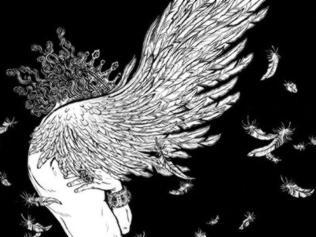Grimm fairytales updated in Michael Cunningham’s Wild Swan
Some familiar fairytale characters are given a modern twist in this collection of short stories.

Michael Cunningham’s latest collection of short stories, A Wild Swan and Other Tales, plays host gleefully and mischievously to modern retellings of classic fairytales.
The English author, best known for his Pulitzer prize-winning novel The Hours, offers a broad-spectrum revision of the Brothers Grimm and others.
It’s far from the first time a well-known author has tackled the canon of fables. American poet Anne Sexton did so memorably in her macabre poetry collection Transformations, where she explored, among other things, Snow White’s menstrual cycle and the Big Bad Wolf’s masculine self-loathing. British novelist Angela Carter, in The Bloody Chamber, highlighted the negative representation of women in fairytales.
Cunningham’s approach in A Wild Swan is to transform the characters of classic stories such as Snow White and Rapunzel into iPhone-using, celebrity-watching, affair-having individuals of today.
Many of the stories adopt an internet news-like style, in an attempt to entice readers to these antiquated narratives through familiar cultural reference points, such as Hollywood stars. This strategy particularly lends stories including Steadfast; Tin and Poisoned (based on Hans Christian Andersen’s tin soldier tale and Snow White respectively) a delightful immediacy and familiarity.
In his foreword, “Dis Enchant”, Cunningham uses the conventions of the confessional personal essay coupled with the hallmarks of the 19th-century omniscient narrator’s opening monologue.
The narrator asks us a series of questions, including whether we would like to cast a spell as these characters do on, say, movie stars, assuring us the stories in this volume offer curses that are indeed “easy to learn”. A Wild Swan, with its pastiche of Victorian literary conventions and its modern jargon, successfully marries fairytales with the zest of our self-obsessed online culture.
For Cunningham, Jack (with the Beanstalk) is a narcissist hell-bent on fulfilling a fantasy fuelled by unchecked greed and hedonism; Snow White is married to a man who has too fully invested in her comatose history, developing a necrophilia that she begrudgingly participates in; and the Beast (partnered with the rather shrewd if self-doubting Beauty) remains a “standard-issue psychopath”, whose isolation in a castle was imposed for more sinister reasons than you might first think.
One of the most entertaining stories is the richly ironic and punchy Little Man, about a troll who helps a young maiden after she is forced to spin straw into gold. As is often the case when we help someone but have an ulterior motive, dire consequences ensue. Cunningham slyly integrates modern dramas – marital strife, custody battles, mortgage repayments — into these fables.
The illustrations by Japanese artist Yuko Shimizu not only enrich the stories but visually depict their darker, more sinister aspects. In Cunningham’s version of Hansel and Gretel, Crazy Old Lady, the behaviour of the Witch is an allegory for desperate attempts to stop the ageing process and remain forever young. The repeated use of the second person singular — “you … and the muddle of your over-used flesh” — relates the witch’s tale to the body-obsessed tendencies of today.
Cunningham situates all of his characters in modern urban settings, mostly rendering them impotent in the face of contemporary social conventions and cultural trends. His ironic approach not only accentuates the capacity of such stories to comment on morality, but also reveals how they can often read in multiple, sometimes contradictory ways.
Nathan Smith is an arts writer based in Melbourne.
A Wild Swan and Other Tales
By Michael Cunningham
Illustrated by Yuko Shimizu,
HarperCollins, 144pp, $24.99



To join the conversation, please log in. Don't have an account? Register
Join the conversation, you are commenting as Logout